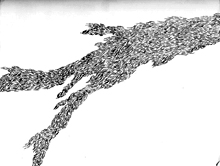Drumheller
By wavelength ~ Posted Tuesday, January 30th 2007
Saturday, February 10 11pm @ salem’s loft
Purveyors of: the asteroid that destroyed the dinosaurs of jazz
Drumheller’s Nick Fraser has not had the best conversations with Wavelength in the past. But maybe that’s just because Wavelength is intimidated. Maybe every time Wavelength gets close to Nick, it forgets what it was going to say and comes off looking like a fool. What’s a series supposed to say to a guy The Globe and Mail called “a deft and sensitive percussionist with a hint of an enigmatic streak, a feeling for economical gestures, and an innate sense of form”? Plus Wavelength thinks Nick is a total hottie. Evan Dickson saw that his friend Wavelength was in love and tried to smooth things out with Nick Fraser and Drumheller.
The last time you were interviewed by Wavelength you were... gruff in your answers. For example, although you are a founder of the Association of Improvising Musicians of Toronto, you called improvisation “the great haven of the unimaginative” and said, “There is no greater crime in creative work.” Are you going to make a mockery of this interview as well? (It’s okay if you are.)
I’ll try to be as sincere as possible. In my defense, I should mention that the questions in the earlier WL interviews that I’ve done included such gems of journalistic inquiry as “What’s your favorite Bond movie?”, “If your band were a pie, what kind of pie would it be?” and “Do you improvise in cooking as well as music?” I felt that my only options were to ignore the questions or to mock them, so I tried a bit of both.
Who else is in Drumheller? Introduce the players.
Myself (Nick Fraser) on drums, Eric Chenaux, one of my favourite musicians, is on guitar. Actually, all of the members of Drumheller are among my favourites: Rob Clutton on bass, Doug Tielli on trombone, and Brodie West on alto sax. One of the things I love about Drumheller is that we all bring very different backgrounds and cultures of music-making to the table (specifically in regards to our individual relationships with jazz music). I find each member’s outlook very refreshing and unique.
How do improvising musicians go about practicing?
I’m sure everyone is different. Generally, when I practice (which is not as often as I’d like), I work on very concrete musical materials. I work on hand technique, jazz language, varied rhythmic structures and cycles, that sort of thing. I do most of my improvising on my gigs, as opposed to in my practice room, if that’s what you’re wondering.
Will your show at Wavelength’s anniversary be improvised?
Drumheller doesn’t play too much purely improvised music. Every tune has a structure, even if it’s minimal.
It seems to me that jazz is gradually going the way of classical music: growing cloistered in academia and enjoyed primarily by elitists and intelligentsia. Do you think jazz retains or deserves any popular appeal?
Well, I don’t think that any music deserves popular appeal and certainly no members of the social and cultural elite come out to any of my gigs, so I’m really not sure. Jazz is music that I like, so that’s why I play it. I really can’t be bothered with lamenting its lack of popularity or with combating ignorance about it. I don’t want to get into an argument here, but words like “elitist” drive me up the fucking wall. It’s a word that people generally use when they’re afraid to say that they don’t like something or don’t understand something. Many people feel that they need to understand something to enjoy it, and if they don’t understand it, they feel stupid. Their low self-esteem is not my fault or my problem. I mean, do you like jazz? How many jazz records do you own? What evidence do you have that this is the case, that jazz is enjoyed primarily by the intelligentsia? How do you expect me to answer this question about a form of music that I’ve dedicated my life to? Any art form is accessible to anybody. To appreciate a form of music, you have to listen to it. Jazz records are at the goddamn record store and on the Internet. If people want to listen to it, it’s there. What is inaccessible about that?
By Evan Dickson
